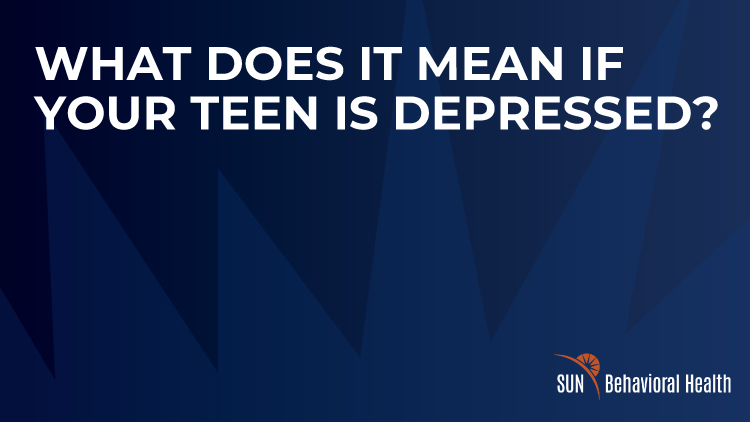Services
- Home
- Mental Health Services
- Who We Treat
- How We Treat
- Patients & Visitors
- About
close

Do you feel like your teenager has suddenly become a different person? You can’t get them to come out of their room, they spend all their time alone, and they don’t seem interested in anything anymore. They seem to have lost interest in hobbies and friends that they used to love. When you can get them to interact with the outside world, it seems like they’re sad, frustrated, or even angry.
Maybe you’re having a hard time connecting with them and getting them to talk to you about their life. Your teen might keep an odd sleep schedule or have lost their appetite. As time goes on, you may feel like things are getting worse and not better. You feel out of touch and at a loss for how to help your child through this.
It can be difficult to tell the difference between a regular teen who stays up all night playing video games and has trouble staying awake during the day and a teen who is depressed.
It can be really scary to watch your teenager go through something as serious as depression, especially when they are so young. Some parents may even feel like their child has no reason to be depressed, or that their child’s mental illness is a failure on the parent's part. It is important to remember that your child’s mental illness is not your fault. However, it is very real and needs to be taken seriously. Mental illness is unlikely to simply go away on its own and needs to be treated like any other serious medical condition.
If your teen is struggling with depression, they are not alone. According to the Substance Abuse and Mental Health Services Administration, from 2016-2019, an annual average of 314,000 people ages 12-17 who experienced a major depressive episode received treatment in Texas.
Here at SUN Houston, we want to connect you and your family to the resources you need to be successful. We believe our company has a responsibility to improve the health and well-being of the communities we serve. We work with hospitals and medical professionals, schools, and social service agencies to ensure that our programs meet the critical, unmet needs of families and individuals struggling with mental health issues.
If you’re afraid your child has depression, researching the subject seems like the natural next step. Depression can seem absolutely terrifying, especially when it’s your teenager who is experiencing it. You have raised them from a tiny baby who needed you for everything into this young almost adult. Knowing that they’re struggling with mental illness, and knowing that it's not a sadness that you can fix with a quick trip out for ice cream like you could when they were a kid, is frustrating and frightening.
This isn’t something you can fix simply, but it is something that you support your child through while you get them the help they need.
To fight depression effectively, it is important to understand what depression is. At SUN Behavioral, it is important to us that our patients, and especially the parents of our adolescent patients, feel empowered to be active participants in their child’s recovery journey.
Depression is one of the most common mental illnesses in the U.S. According to the National Institute on Mental Health or NIMH, symptoms must be present for at least two weeks for your teenager to receive a diagnosis of depression. Like many people with depression, teenagers struggling with depression often have difficulty maintaining a routine. It can make small tasks like doing homework or chores feel like a million little individual tasks that are practically impossible to get done due to a lack of mental and physical energy.
Depression may make a teen feel like their life is hopeless and they have no future, even if you know all the amazing things they are capable of. This sense of hopelessness can impact their self-esteem and make it feel like it doesn’t matter if they finish small daily tasks like eating, sleeping, or showering because they may feel they are not worth the effort. This lack of self-care often then makes the depression worse. Depression can be a very vicious cycle, and it can be difficult to pull yourself out of, especially for teenagers.
Depression can happen to anyone at any age, regardless of all the positive things in a person’s life. Teens may struggle to see the good things in their life if their depression feels too overwhelming. Depression can make other physical illnesses worse, and physical illnesses often take a toll on a person’s mental health.
Sometimes depression can be caused as a side effect of a medication for some other kind of illness. If your teen is on a prescription medication, it is important that you both talk to their doctor about depression as a potential side effect.
The exact causes of depression are complex and usually the result of multiple different factors in a person's life. Often, depression is attributed to environmental factors, genetics (passed down from generation to generation), and psychological history. For some people, a chemical imbalance in the brain may play a role in their depression. For many others, there is some kind of trigger for depression. That might be the death of a relative or friend, a social falling out, a breakup, or some other traumatic event.
Your child may be at greater risk of depression if they have experienced serious trauma, if you have a family history of mental illness, if they have gone through sudden changes, if they are under increased stress, or if they are on a new medication.
At the same time, there may be no obvious trigger for their depression. Every person experiences their mental health differently. If you are worried about your teenager, it is important to have a calm conversation about their mental health where you listen to what they say they are feeling.
No two people are exactly alike, so depression looks a little bit different for everyone. Even if you as a parent have depression, your child may experience depression differently.
Some common signs a teenager is going through depression are:
Not all of these signs individually necessarily mean that your child is suffering from depression. However, showing many of these behaviors at the same time likely means a teen is depressed. Evidence of self-harm and suicidal behavior are especially dangerous signs of depression and are indicators that immediate treatment is needed.

When it comes to the psychological and physiological symptoms of depression, it is still true that no two people are the same. Symptoms may be different for your child than they are in other people you know in real life or from pop culture who have had depression. It is important to listen to your child when they describe their experiences with mental health and let them know that their pain and experiences are valid.
Depression can typically be diagnosed after having two weeks of consistent symptoms. For most teens who are experiencing clinical depression, some of these symptoms will occur nearly every day. Some symptoms may change depending on outside influences and other things going on in your child’s life.
Common symptoms of depression include:
Even if you think your child is only showing a few of the symptoms, the best course of action is still to get them into treatment as soon as possible. Depression can actually be easier to treat if treatment begins while symptoms are less severe. Without treatment, symptoms are likely to get worse.
The longer depression goes untreated, the greater the risk of your child hurting themself or someone else. If your child is suffering from depression, even if it is not severe, they deserve the best care and treatment available to them so they can get to feeling better as easily as possible.
There are actually several different types of depression. A few of the types of depression that occur in adolescents include:
MDD or major depression is the most common type of clinical depression. Your child may feel like they have no energy or interests, or like they are stuck in their heads with lots of negative thoughts and don’t know how to get out. The NIMH estimates that in 2019, 3.8 million adolescents ages 12 to 17 in the U.S. experienced at least one major depressive episode.
Persistent depressive disorder, formerly known as dysthymia, is another common form of depression. It is similar to MDD and has most of the same symptoms, but may not reach the same level of intensity. People with PDD often have an easier time functioning day to day than people with MDD, but their symptoms typically last much longer. The thing that makes PDD different from MDD is that persistent depressive disorder lasts for at least two years. Treating depression at the first sign of symptoms can help to prevent PDD from developing.
Bipolar disorder is marked by extreme mood swings. These types of mood swings would not be the typical kind of moodiness of a hormonal adolescent. Bipolar disorder occurs when a person’s emotions swing quickly from mania, or extreme highs in emotion, to depression, or extreme lows. These would lead to radical, quick changes in thoughts, actions, and feelings.
Manic periods typically may include big ideas, easy excitement, and lots of unfocused energy. This is usually followed by an extreme depressive episode where the person feels very tired and sad. Bipolar disorder is different from other forms of depression and is often treated using different forms of medication than typical antidepressants.
Common symptoms of manic episodes include:
Common symptoms of depressive periods include:
Seasonal affective disorder or SAD often occurs later in the year when the days get darker and shorter. This may be because of changes in the body's natural rhythms, a lack of light, or chemical changes in the brain. Tools typically used to treat depression often work on SAD, but many professionals also use light therapy, where a person sits near a bright light source for a period of time.
This is a type of depressive disorder that is unique to people who menstruate, including many teenage girls. It is a severe form of premenstrual syndrome. In this case, the symptoms of depression may be brought on when a person stops ovulating around the time that menstruation starts.

At SUN Behavioral, we have high-quality adolescent counseling services. We offer three different levels of care for adolescents, including inpatient treatment, a partial hospitalization program, and an intensive outpatient treatment option. A different level of care may be more appropriate for your child depending on the severity of their mental illness.
At SUN Behavioral, we understand that everyone has different needs. All of our programs are tailored to the individual, but our adolescent program often includes behavioral therapy, stress management training, and family therapy.
If you believe your child needs care for depression, get started today. Call (713) 796-2273.
Which symptoms are commonly associated with adolescent depression?
Depression looks different for different people. Symptoms may differ depending on the age, physical health, gender, and mental health triggers a person is experiencing.
Some common symptoms include:
What are the three main symptoms of depressive disorders?
There are many symptoms of depression that your teenager might show. Sadness, loss of interest, and new or worsening irritability are three very common signs of adolescent depression. However, there are many symptoms listed above that your child may or may not have. Do not wait until your child is having many symptoms of depression. If you believe that your child is depressed, get them treatment as soon as possible.
What are the five characteristics of depression?
There are more than five characteristics of depression. Five very common symptoms of depression include trouble sleeping, trouble eating, low self-esteem, trouble maintaining a routine, and reoccurring thoughts of suicide or self-harm. There are many more potential signs and symptoms as listed above. Do not wait until your teen is showing lots of symptoms. If you believe a teenager in your life is suffering from depression, get them treatment as soon as possible.